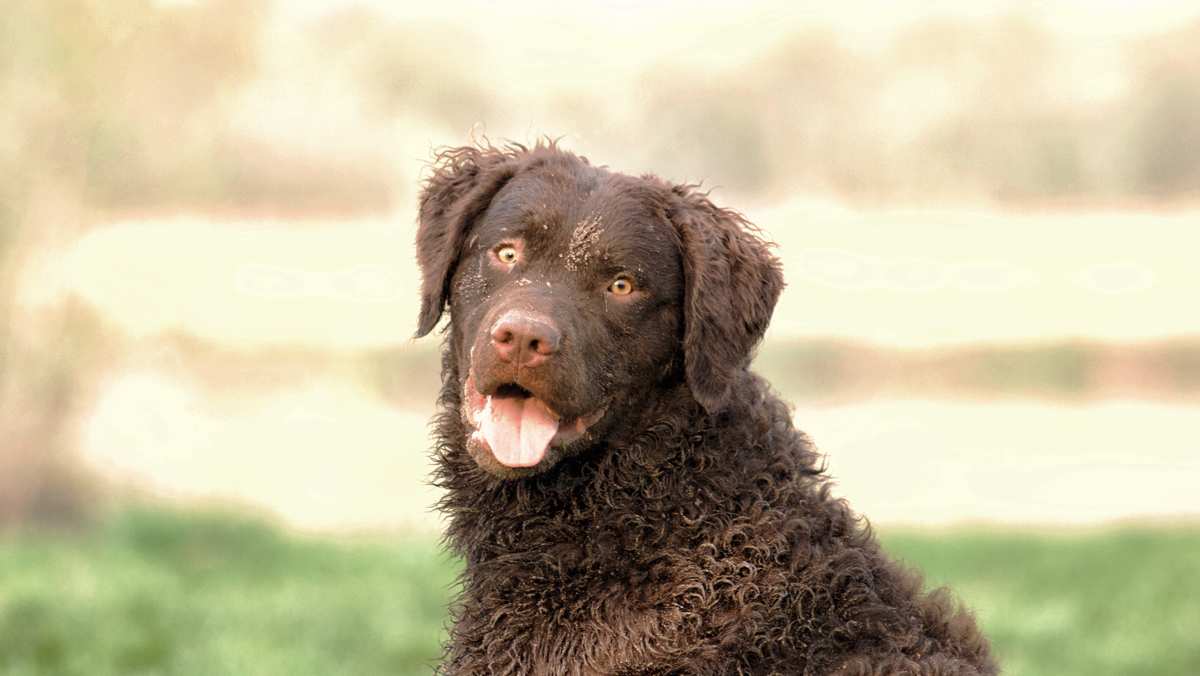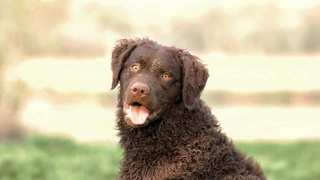Curly Coated Retriever Dog Breed
The Curly Coated Retriever is a versatile, gentle mouthed land and water retriever. They are smart, trainable and family oriented. Protective and aloof with strangers, they make great household guardians. Curlies are loving and gentle with kids but may need early socialization to get along with other pets. We recommend you only consider this breed if you are a hunter/sportsman or an outdoorsy, active owner. They may only require a small amount of grooming but need a ton of exercise. The breed is of average health and usually lives 8-12 years.
Curly Coated Retriever Breed Details
Recognized as a member of the Sporting Group as early as 1924, the Curly Coated Retriever is one of the oldest Retriever breeds. First shown in Birmingham, England in 1860 they became popular, not as aristocratic hunting companions, but as the average man's hunting dog. The AKC recognized the breed in 1924, however, they are rare in the United States and no longer hold such high popularity in England; they are common in Australia and New Zealand though. They are proud, confident and eager to please while on the job and are prized for their versatility on land and water as well as for their gentle-mouthed handling of game. This breed is not an apartment dog but should live (or spend plenty of time) indoors in homes where these is ample space for them. Access to a large property or yard is essential since this breed requires a high amount of daily exercise. Consider the following Curly Coated Retriever facts to help to understand the problems and benefits to ownership:
PROS
- Versatile retriever, gentle
- Loyal and protective
- Good watchdog
- Usually easily trained
- Excellent family companion
- Happy exercise buddy
- Low maintenance grooming
- Can do well with other pets
- Wants to be involved as much as possible
CONS
- Not hypoallergenic
- Aloof or shy around strangers
- High level daily exercise required
- May need extra socialization to get along well with other pets
- Nuisance if bored or lonely
- Can seem independent and stubborn
- Not an apartment dog
- Yard or large property a must
Purebred
8 - 12 yrs.
23 - 27 in.
60 - 70 lbs
OverallFamily FriendlyChild FriendlyPet FriendlyStranger Friendly
Easy to GroomEnergy LevelExercise NeedsHealthShedding Amount
Barks / HowlsEasy to TrainGuard DogPlayfulnessWatch Dog
Apartment DogCan be AloneGood for Busy OwnersGood for New OwnersIntelligence
Curly Coated Retriever Breed Description
The Curly Coated Retriever is a large, strong and elegant looking breed. Individual measure 23-27 inches at the shoulder and weigh 60-70 pounds. The black or liver (dark brown) single layer coat is short yet made up of tight curls that protect him/her from brush and insulate in cold water. The Curly has small ears but large eyes that are amber to black, depending on the shade of the coat-- same with the nose (black for black coats, liver for liver coats). This page will give you some basics on the Curly's intelligence, activity level and temperament.
Intelligence- Smart and eager to please, this breed is easily trained if you are firm and consistent. If they are under stimulated, both physically and mentally, they may develop destructive or annoying behaviors.
Kids, Strangers, Pets- This breed makes for an excellent family companion because they are gentle and loving with kids. They will remain aloof and reserved around strangers and make protective and loyal watchdogs. Most get along ok with other pets but should be socialized as early as possible for the best results.
Exercise- Curlies are best suited for hunters but they can be equally happy with an active, outdoorsy owner or family. A minimum of one hour daily exercise is recommended and they enjoy swimming, running, hiking, biking, sports-- really anything they can do with you!
Curly Coated Retriever Breed History
The general consensus is that these Retrievers were conceived in England in the late 18th century. They seem to have been quickly exported to Newfoundland back when England was still ruling the entire North American eastern seaboard. Although Curly Coated Retriever history is murky for what is believed to be its first century or so, it's also believed that there are definite direct descendants. The three breeds believed to have been crossed to produce the Curly were the Old English Water Dog, the smaller Newfoundland, and the Irish Water Spaniel.
The breed was officially known in 1860 when one of these gun dogs was successfully entered at a dog show in Birmingham, England. By the end of the 19th century, when the Poodle was believed to have been added to the mix (and brought the namesake coat to be one of the breed's characteristics), the Curly-Coated Retriever was well-known despite the unrecorded rise in popularity. By the very early 1900s, they were in the United States. The American Kennel Club (AKC) formally recognized the breed very quickly thereafter in 1924. It took several more decades, however, until this particular Retriever had an actual club in the States. Established in 1979 and named the Curly-Coated Retriever Club of America, this club came long after the popularity of the cousin breed, the Flat-Coated Retriever, had practically replaced the Curlies. In most of the Western world, however, the breed is overshadowed by the Flat-Coated Retriever when it comes to the duties the two breeds share.
These days, the Curly Coated Retriever is a very popular hunting dog in New Zealand and Australia. There, there is a smaller version of the breed that is informally called the Murray River Curly Coated Retriever. There is also some talk among Retriever breeders that these smaller dogs might should be considered not a variation but a separate breed.
Curly Coated Retriever Variations
Curly coated retrievers do not vary much among purebred individuals. When searching for Curly Coated Retriever puppies some owners will mistake the Murray River Curly Coated Retriever with this breed. They are not the same breed, although they do share some physical similarities with the Australian Murray.
Curly Coated Retriever Temperament
The temperament of a Curly Coated Retriever is most often described as smart, confident and proud in the field and in the water-- they are, after all, one of the oldest retriever breeds. They are also highly trainable and eager to please, even if they don't look like it; Curlies have a tendency to think independently and sometimes this can be mistaken for stubbornness. If you are a firm, consistent owner that can commit to training your puppy from the start, you shouldn't have many problems!
Loyal, loving and gentle, the Curly Coated Retriever makes an excellent family companion. He/she will prefer to live indoors with you and spend as much time with you as possible, but should be fine if you have responsibilities to attend to during the day. A bored, lonely Curly can be a mischievous mess to deal with so make sure you have time to exercise and train with them daily.
This breed is great with kids, supervision is still necessary with small children. They will make decent watchdogs for the household and are rather shy around strangers if not socialized early. Your curly will PROBABLY get along well with other pets if brought up with them otherwise they may be aloof.
Living with a Curly Coated Retriever is not a decision to be made lightly. The ideal home for them in a large living space (not an apartment) and access to a large yard or property so they can have daily outdoor access. Hunters and sportsmen make the best match for this dual purpose dog but they also thrive as part of an active, outdoorsy family. Curlies need plenty daily exercise-- a minimum of an hour is best.
They make good watchdogs and protective household guardians. Members of this breed should be fine while you're away at work but are very sensitive and loving, wanting to be around you as much as possible.
Curly Coated Retrievers are not hypoallergenic. Although their short, curly coat doesn't require much grooming, they are still average shedders.
Curly Coated Retriever Health
The Curly Coated Retriever is of average health for a pure breed-- they have less concerns than many breeds but there are still a handful of conditions to be aware of. Remember, your Curly may not have any of these issues and may live their full lifespan of 8-12 years in excellent health. To have the best odds, choose a reputable breeder that can offer proof of health certifications, especially for the parents and make sure to schedule routine vet visits.
- Bloat can occur in most larger dogs so don't let them "wolf down" their food
- Hip Dysplasia is pretty common in the breed
- Eye Problems such as Progressive Retinal Atrophy and eyelid disorders are sometimes seen
- Hair loss and baldness can afflict this breed
- Exercise Induced Collapse
- Cancer with Mast Cell Tumors being the most common
- Heart Disease is becoming more frequent
- Glycogen Storage Disease IIIa is a metabolic disease affecting the muscles and live that was first found in this breed
Curly-Coated Retriever Health Concerns
Below are potential health concerns associated with Curly-Coated Retrievers.
Bloat
Cancer
Hip dysplasia
Heart problems
Eye diseases
Hair Loss
Glycogen storage disease type III
Exercise Induced Collapse

